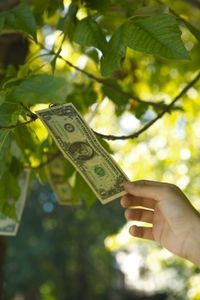Think of this as Volume 15, Number 36 of A-Clue.com, the online newsletter I've written since 1997. Enjoy.
 The way to success as a manager, or a consumer, is to focus on the low-hanging fruit.
The way to success as a manager, or a consumer, is to focus on the low-hanging fruit.
That's the easy money. That's the opportunity that will give you the most profit with the least investment.
But identifying the low-hanging fruit is extremely difficult.
And at the bottom of a recession, at the start of a major sea change in how we live, that in itself is the low-hanging fruit.
For instance, most people know that "green" is good, and that it's profitable. But they are frozen in place, unable to move, because they don't know where the low-hanging fruit is.
There is an enormous profession in maintaining the efficiency of business operations, of identifying waste and taking it out, starting with the large sources and moving on to the smaller ones. This is why American business works so well. People are empowered to do this, and over time they do.
Of course public opinion lags this badly. One quick example. Most people know Southwest Air is the most efficient U.S. air carrier, and that companies like Delta (which run an old-style hub-and-spoke system) are much less profitable. But did you know that Southwest is among the most unionized of American carriers, Delta the least-unionized?
The issue, in other words, the source of inefficiency, may not be what you think.

Office operations around the country have been focused on using computers for efficiency. They see worker productivity as the way to greater profits. As computers replace what people were doing, headcounts decline. The pressure to do this increases during recessions, and in this most recent one we reached a turning point. Middle managers disappeared in droves, and those jobs aren't coming back any more than the factory jobs of a generation ago came back. They became the low-hanging fruit.
Meanwhile the vast consumer market faces a host of questions with few answers:
-
How much can I really save trading out my SUV for a smaller car, and will that make up the loss on the used car plus the purchase price of a new one?
- Do I have enough R-Value in my attic, in my walls, in my floor? Which project offers the most bang for the buck?
- Should I put up a solar panel?
- Should I replace my water heater?
- How long will it really take for an investment in LCD light bulbs to pay off?
The answer is, of course, that your mileage will vary.
Take the car question. How much do you drive, and how much do you really haul? Where do you go? You might save more, and spend less, by seeking out someone to drive to work with you.
There are different considerations to water heaters. Solar heaters and heat exchangers work great in a desert, not so well in a forest. Electricity, natural gas and propane have different prices in different places. For some people, switching from an electric tank to a natural gas-fired "tankless" heater may save you more money than going solar.
The history of technology is one of steadily declining margins, as technology advances. Back in the 1970s, selling someone a computer and software set-up required a team of salesmen, all highly-paid. The margins lay in education and distribution, not so much in making hardware or even writing software.
That's where we are in green technologies. It won't always be this way, but right now the big money lies in showing people where the low-hanging fruit is and how they can invest their money profitably in saving energy. It's not in making solar panels, or even installing them, because the cheapest renewable energy is energy you don't use. It's efficiency.
Want to make some money? Research this in your area. Find out where the low-hanging fruit is where you live, based on your local utility rates, your climate, your area's housing stock and living patterns. Then find people who want to save money, help them do that, and take your cut.
This recession can be over in a hurry if we focus on the low-hanging fruit.











